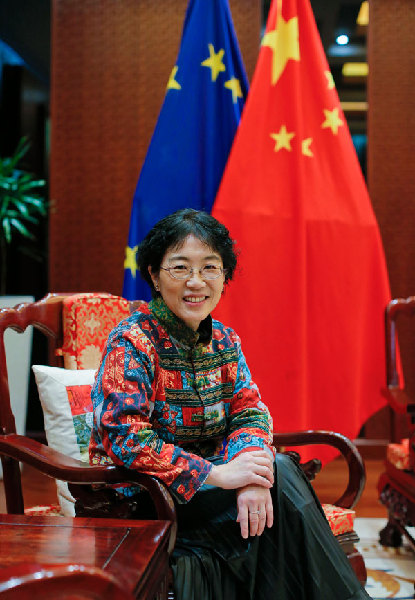Some South China Sea arguments are just wrong: Ambassador
Updated: 2016-05-24 23:25
By Yang Yanyi(chinadaily.com.cn)
|
|||||||||
 |
|
Yang Yanyi, Chinese Ambassador heading the Chinese Mission to the EU. [Photo provided to chinadaily.com.cn] |
For some time now, the South China Sea issue has attracted much attention and media coverage. Some accused China of changing the status quo in the South China Sea by taking unilateral actions that caused tensions in the region. Some claimed that China's refusal to recognize and accept the "Award" on the South China Sea to be issued by the Arbitral Tribunal established at the unilateral request of the Philippines would be "in violation of international law".
These arguments are but biased and unjustified.
As the waters of the South China Sea issue have been so muddied up by certain intentional forces, it is highly necessary to help those who are truly interested in the maintenance of peace and stability in the South China Sea to get the facts and essence of the matter straight.
I. The real issue is disputes over territorial sovereignty.
China enjoys sovereignty over the South China Sea Island, (the Xisha, Nansha, Zhongsha and Dongsha Islands) and the adjacent waters since ancient times.
The Nansha Islands comprise over 230 islands, islets, sandbanks, rocks and shoals that are scattered along a 1,000 kilometer span from the southeast to the northwest of the Sea. This area was discovered and named by China as the Nansha Islands, over which China has continuously exercised sovereignty in a peaceful, effective and uninterrupted manner.
Beginning in the 20th century, western colonial powers, including France and Japan, kept coveting the Nansha Islands as they colonized Southeast Asia and invaded China. Yet, due to strong resistance from China, most of their territorial ambitions ended in failure.
The Cairo Declaration of November 1943 proclaimed that Japan shall be stripped of all the islands in the Pacific and that all the territories Japan has stolen from the Chinese shall be restored to China. The 1945 Potsdam Declaration reiterated the proclamation of the Cairo Declaration.
It has been widely recognized by the international community that the Nansha Islands and the adjacent waters belong to China, and no country ever challenged this during a long course of history.
It was only since the 1960s and 1970s specially after the discovery of abundant oil reserves in the Nansha waters and the coming into being of the United Nations Convention on the Law of the Sea (UNCLOS/the Convention) that some countries in the region illegally occupied 42 of China's islands and reefs as part of the Nansha Islands in violation of the Charter of the United Nations and fundamental principles of overning international relations.
It is obvious from the above: One, China is the victim of the South China Sea issue. Two, the real disputes are centered on sovereignty and rights over the Nansha Islands and the adjacent waters caused by illegal occupation. Three, the other is the dispute over maritime delimitation caused by overlapping claims of maritime jurisdiction.
II. Settlement of territorial sovereignty dispute is beyond the scope of the UNCLOS.
There is the argument that the Philippines initiated the arbitration in line with international law, and that the Philippines didn't request the Tribunal to decide on the issue of sovereignty, but only requested the Arbitral Tribunal to decide that some features in the South China Sea are low-tide elevations incapable of generating any maritime entitlement. And in some corners of the world, there have been demands on China to abide by international law, especially the UNCLOS and its arbitration procedures.
As a saying which goes: there is more than meets the eye. The South China Sea Arbitration against China initiated by the Philippines is very deceptive. Abundant evidence has shown that the Philippines is actually focusing on territorial sovereignty and maritime delimitation, and its actual objective is but to deny China's sovereignty over maritime features of the Nansha Islands, and to legitimize its unlawful stealing of maritime features of the Nansha Islands from China.
So it is highly advisable that before talking of respecting and acting in accordance with international law, one needs to get clear in the first place the subject matter in question and its essence and what international law is all about.
As above illustrated, the true nature of the South China Sea issue is territorial sovereignty dispute. Given that disputes over territorial sovereignty concern China's core interests, and that the settlement of such kind of dispute is beyond the scope of the UNCLOS and its arbitration procedures; and does not concern the interpretation or application of the Convention, China like many other countries in the world goes for bilateral negotiation rather than third-party dispute settlement mechanism, not to mention accepting the jurisdiction and solutions imposed by third-party mechanisms that are not chosen by it voluntarily.
To add a further point, as a basic principle of arbitration, for an arbitral award to be recognized and implemented, one of the preconditions is, the arbitral tribunal that renders the award has jurisdiction over the disputes. If the tribunal lacks jurisdiction, the arbitration proceedings shall not be continued. Even if they are carried forward, the outcome would be invalid, and shall neither be recognized nor implemented. The tribunal shall not decide on its jurisdiction arbitrarily, but prudently in line with international law including the UNCLOS.
III. Application of compulsory arbitration is subject to several preconditions.
It is worthwhile to underline here that of the various means to peacefully settlement of disputes, compulsory arbitration is only a new type of procedures established under the UNCLOS, and which is subsidiary and complementary to negotiation and consultation, and its application is subject to several preconditions.
As illustrated by Mr. XU Hong, Director-General of the Department of Treaty and Law of the Ministry of Foreign Affairs of China, there are four preconditions or four bars for States Parties to initiate compulsory arbitration, and for the arbitral tribunal to establish its jurisdiction.
First, compulsory arbitration can only be applied to disputes concerning the interpretation and application of the Convention. If the subject matters are beyond the scope of the UNCLOS, the disputes shall not be settled by compulsory arbitration. The issue of territorial sovereignty is one such case. Consequently States shall not initiate compulsory arbitration on disputes concerning it; and even if they do, the arbitral tribunal has no jurisdiction over them.
Second, a State Party to the UNCLOS may declare in writing that it does not accept compulsory arbitration with respect to disputes concerning maritime delimitation, historic bays or titles, military and law enforcement activities, etc. Such exclusions are effective for other States Parties. With respect to disputes excluded by one party, other parties to the dispute shall not initiate compulsory arbitration; and even if it does, the arbitral tribunal has no jurisdiction over them.
China's 2006 Declaration on Optional Exceptions made in accordance with Article 298 of the UNCLOS excludes disputes concerning maritime delimitation and some other issues from the dispute settlement procedures under the UNCLOS. The unilateral initiation of arbitration by the Philippines is a violation of the right to seeking dispute settlement of its own choice that China enjoys as a State Party to UNCLOS.
Third, if parties to a dispute have agreed on other means of settlement of their own choice, no party shall unilaterally initiate compulsory arbitration; and even if it does, the arbitral tribunal has no jurisdiction over the disputes. Given that China and the Philippines have agreed to settle their disputes in the South China Sea through negotiations, the Philippines is precluded from initiating arbitration unilaterally.
Fourth, parties to a dispute are obliged to first exchange views on the means of dispute settlement. Failing to fulfill this obligation, they shall not initiate compulsory arbitration; and even if they do, the arbitral tribunal has no jurisdiction over the disputes. And the actual fact is the Philippines failed to fulfill the obligation of exchanging views with China on the means of dispute settlement.
The above four preconditions, acting as the "four bars" form a part of the package system of dispute settlement, which shall be interpreted and applied comprehensively and in its entirety.
The very reason why China neither accepts nor participates in the arbitration lies in the fact that the Arbitration Tribunal does not have jurisdiction over the issue and is illegal from the very beginning. The so-called "Award" issued by a tribunal so established does not have any legal validity. By doing so, China is exercising its rights endowed by the international law and safeguarding the international rule of law.
It should be also emphasized that according to one of the basic principles of law, an arbitral tribunal must firstly have jurisdiction before it deals with the merits, no matter what award it makes. If it does not have jurisdiction, its subsequent actions will have no legal basis. Without jurisdiction, all its acts, including the so-called award made eventually, would be meaningless in law, just as water without its source or a tree without roots.
IV.China is doing nothing more than maintaining and defending its long-standing and legitimate position.
Lately, some people seem to be concerned about freedom of navigation and over-flight and militarization in the South China Sea. Some have alleged that China's island reclamations and construction work on its maritime features in the South China Sea is the main source of instability.
While these concerns are duly taken note of, I am afraid that fingers have been put on the wrong root cause.
The Chinese side has made crystal clear the rational and purpose of what it has been doing on some of the Nansha islands and reefs: It is nothing but maintenance and construction work with the main purposes of optimizing their functions, improving the living and working conditions of personnel stationed there, better safeguarding territorial sovereignty and maritime rights and interests, as well as better performing China's international responsibility and obligation in maritime search and rescue, disaster prevention and mitigation, marine science and research, meteorological observation, environmental protection, navigation safety, fishery production service and other areas.
Our maintenance and construction work does not target nor affect any country, nor does it have any impact on the freedom of navigation and over-flight in the South China Sea. There has been no complaint from the commercial shipping business about inconveniences or insecurity as such and there is no jump in shipping insurance rates. Facts speak for themselves.
With regard to freedom of navigation and over-flight in the South China Sea, as one of the major trading countries in the world, with a huge volume of import and export and energy supply going through South China Sea, stability there is very much of our interest. China is more concerned than anybody else about freedom of navigation and over-flight in the South China Sea, and China has always been sincere and serious in respecting and safeguarding freedom of navigation and over-flight in the South China Sea.
That said we do have our share of concerns about the real root cause of the continuing tension in the South China Sea, serious provocations by the U.S. politically and militarily.
The United States has been asserting that it is against actions to militarize the South China Sea. Yet, it is the United States that has been sending more and more military vessels and aircrafts in close proximity to China's coastal waters, constituting grave threats to China's security on land and sea, and threatening to escalate tensions in Asia.
More and more Chinese people have good reasons to believe that the U.S. is no longer just an invisible hand behind the rising tension in the South China Sea. They are afraid that the deployments by the U.S., if not curbed, can only have the effect of militarizing the region.
And also in the eyes of many that freedom of navigation, a concept originally designed by the U.S. as a counter-measure against the freedom of navigation defined by the Convention, has been conveniently used by the U.S. these days to justify its military actions in the South China Sea and the freedom of movement of its navy around the world.
Equally disturbing is that the statements and actions by the U.S. would most probably embolden some players to be even more aggressive and provocative. It has been made public that the U.S. alliance obligations would be invoked if China responds to such provocations. As pointed out by H.E. Ambassador Cui Tiankai:"It could be possible that all this is intended to intimidate China, not to start a real conflict. But what if China is not intimidated? This approach is clearly a path to conflict. It is indeed a dangerous path and an irresponsible policy".
V. China stands for peaceful solution of the issue through dialogue and negotiation.
China's pursuit in the South China Sea has been consistently maintained. That is to safeguard national territorial integrity and maintain regional peace and tranquility. Accordingly, though China is the victim of the South China Sea issue, it has been firmly committed to resolving disputes peacefully through friendly consultations and negotiations with countries directly concerned.
This sincerity and commitment by China has been a deciding factor for stability of the situation in the South China Sea.
Especially since the late 1990s, China has been proactively engaged with some directly concerned parties of ASEAN to work out possible solutions of sovereignty disputes over islands and reefs in question through bilateral consultation, and with ASEAN as a whole to build up confidence and to collectively maintain peace and stability in the region.
I am proud to say that as head of the Chinese delegation taking part in the first few rounds of Working Group Meeting on the draft of Declaration on the Conduct of Parties in the South China Sea (DOC), I myself contributed in a small measure to such a significant endeavor.
From my personal experience working with ASEAN and its member states, I should say that China and ASEAN countries have the wisdom and every capability to resolve disputes peacefully and maintain peace and stability in the South China Sea on their own.
Now, China is working with ASEAN countries to implement the DOC and we are speeding up the "code of conduct in the South China Sea" consultation.
With a view to securing common interest and common objective of maintaining long-lasting peace and stability in the South China Sea, China has made quite a few proposals.
Firstly, the disputing parties must peacefully resolve their disputes through negotiation in accordance with the DOC. Article 4 of the DOC makes it crystal clear that the dispute must be resolved by the directly concerned states. And the leaders of China and 10 ASEAN countries signed off on the DOC. This is a binding commitment. Regrettably, the Philippines has closed the door of dialogue with China. Still, China and other ASEAN countries are doing our best to implement Article 4 of the DOC.
Secondly, pending eventual solutions, countries in the region, claimants or otherwise, that border the South China Sea must work together to maintain peace and stability in the South China Sea, and to uphold the freedom of navigation in accordance with international law. China has played and will continue to play its responsible and constructive role.
Thirdly, it is hoped that countries outside of the region support the resolution of the disputes through negotiation between the directly concerned parties, and support the efforts of China and ASEAN to maintain peace and stability in the South China Sea. We hope countries outside the region could play a constructive role.
So long as the above-mentioned points are put in place, peace and stability in the South China Sea will continue to be maintained.
As pointed out by Ms. Fu Ying and Mr. Wu Shichun in their article contributed to the National Interest -- South China Sea: How We Got to This Stage, "the future direction of trend would very much depend on the perceptions and choices of the parties involved. If they choose to cooperate, they may all win. If they choose to confront each other, they may only head for impasse or even conflict and no one can benefit totally."
China and the EU have shared strategic interests in maintaining the freedom and safety of navigation, and promoting stability and prosperity in the South China Sea area. Yet, China and the EU are not disputing parties to each other, and the South China Sea issue is not an issue between the two.
Given this, we sincerely hope the EU will strictly abide by its political commitment of respecting China's sovereignty and territorial integrity and China's position on the South China Sea issue and refrain from taking any action that constitutes interference in the South China Sea issue. We also hope that the EU will play a constructive role by supporting the resolution of the disputes through negotiation between the directly concerned parties, and support the efforts of China and ASEAN to maintain peace and stability in the South China Sea.
The author is Chinese Ambassador heading the Chinese Mission to the EU.
Related Stories
Outsiders should respect regional order in South China Sea, says spokesman 2016-05-24 21:11
Annual South China Sea fishing ban begins 2016-05-16 15:06
China's sovereignty over South China Sea islands long recognized by intl community 2016-05-15 08:26
Illegal fishing targeted in South China Sea 2016-05-06 08:30
Chinese navy to conduct drill in South China Sea 2016-05-04 22:07
Today's Top News
Russia blasts NATO for Cold War mentality
Vietnam, US adopt statement on partnership
Alibaba expands in Belgium amid protectionism
Eiffel Tower to become rental apartment for first time
Wreckage of crashed EgyptAir plane found at sea
Still learning
EgyptAir denies finding wreckage of missing flight
China urges US to halt close surveillance
Hot Topics
Lunar probe , China growth forecasts, Emission rules get tougher, China seen through 'colored lens', International board,
Editor's Picks

|

|

|

|

|

|







